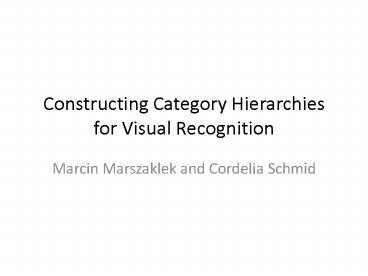Constructing Category Hierarchies for Visual Recognition
1 / 20
Title:
Constructing Category Hierarchies for Visual Recognition
Description:
Constructing Category Hierarchies for Visual Recognition Marcin Marszaklek and Cordelia Schmid * * * * * * * * Introduction Hierarchical classification scales well in ... –
Number of Views:90
Avg rating:3.0/5.0
Title: Constructing Category Hierarchies for Visual Recognition
1
Constructing Category Hierarchies for Visual
Recognition
- Marcin Marszaklek and Cordelia Schmid
2
Introduction
- Hierarchical classification scales well in the
number of classes - O(n2) one-vs-one
- O(n) one-vs-rest
- O(log(n) classification tree
- Previous works to construct class hierarchies
- By hand Zweig07
- From external sources Marszaklek07
- From visual similarities
- Exhaustive Yuan06
- Top-down Chen04, Griffin08
- Botton-up Zhigang05, Griffin08
3
Motivation Disjoint VS overlap
- Previous works disjoint partitioning of classes
(class separability) - Increasingly difficult to disjoint partition for
large number of classes.
- Propose relaxed hierarchy postpone uncertain
classification decisions until the number of
classes get reduced and learning good decision
boundaries becomes tractable.
4
Method
- Building relaxed hierarchy
- Train top-down classifiers using hierarchy
5
Building top-down relaxed hierarchy
- Using balanced Normalized-cut, split the set of
classes such that - Further relaxation
- Find the class on boundary
- Define the split (a overlap ratio)
, given a partition
6
Building top-down relaxed hierarchy conti.
7
Train/test top-down classifiers
- Training hierarchy
- For each node of DAG, samples of Ln\Rn as
positive sample, Rn\Ln as negative samples - Samples in classes XnLn ? Rn not for training
- Testing
- Traversal DAG until a leaf is reached.
- The decision is either directly the class label
(leaves containing one class), or performing OAR
classification on the remaining classes in
current leaf.
8
Results one-vs-rest
Confusion between mountain/touring bikes
High intra-class variability
Low intra-class variability
9
Class hierarchies caltech 256
hand-crafted hierarchy
relaxed hierarchy
Disjoint visual hierarchy
Categories animal, natural phenomena and
man-made objects
10
Results
Average per-class accuracy on Caltech-256
11
Results conti.
Complexity in the number of classes r relaxed
training sample per class.
Speed-for-accuracy trade-off
12
Learning and Using Taxonomies For Fast Visual
Categorization
- Gregory Griffin and Pietro Perona
13
Motivation
expensive
Given a testing sample
O( category)
inexpensive
O( log2( category))
One-vs-rest strategy VS hierarchical strategy
14
Methods
- Building confusion matrix
- Building Taxonomies
- Re-train top-down classifiers
15
Building confusion matrix
- Multi-class classification one-vs-rest strategy
- Classifier Spatial Pyramid Matching
- Training data only and loo validation
16
Building Taxonomies
- Intuition
- Categories that are easily confused should be
grouped together - Decisions between easily-confused categories
sholuld be taken later in the decision tree. - Method
- Self-Tuning Spectral Clustering
- Greedy, bottom-up grouping using mutual infor.
17
Re-train top-down classifiers
- Known the taxonomy tree of categories as a binary
tree - At each node, reformulating a binary-classifier
- Again, using Spatial Pyramid Matching SVM
- F_train 10
18
Results
Red insects Yellow birds Green land
mammals Blue aquatic mammals
Taxonomy tree for Caltech-256
19
Trade-off between performance and speed
Spectral clustering
Greedy clustering
A ordinary one-vs-rest multi-classifier C each
testing image goes through the tree B
intermediate level
N_train 10 5x speed up with 10 performance
drop
20
Results
Cascade performance / speed trade off as a
function of training example/class 20x speed up
with 10 performance drop for N_train50































